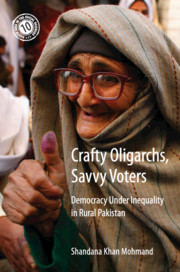Book contents
- Frontmatter
- Dedication
- Contents
- List of Tables and Figures
- Acknowledgements
- Glossary of Local Terms
- 1 Introduction: Rural Voters under Inequality in an Emerging Democracy
- 2 Colonial Constructs and Post-colonial Politics: 1849–2018
- 3 Landed Power in Sahiwal: From Domination to Intermediation
- 4 Local Competition and Bargaining Power: Conceptualising Political Engagement in Rural Punjab
- 5 Bargaining with Landlords: Comparing Political Engagement in Unequal Contexts
- 6 Structural Inequality and Variations in Political Engagement
- 7 When Do Shifts in Political Engagement Occur?
- 8 Conclusion: The Future of Pakistan's Democracy
- Annex 1 Chronology of Political Events in Pakistan
- Annex 2 Index of Political Engagement (IPE) Scores for 38 Villages
- Annex 3 Research Instruments
- Annex 4 Detailed Descriptions of Household Variables Used in Multivariate Regression Analysis
- Bibliography
- Index
4 - Local Competition and Bargaining Power: Conceptualising Political Engagement in Rural Punjab
Published online by Cambridge University Press: 26 April 2019
- Frontmatter
- Dedication
- Contents
- List of Tables and Figures
- Acknowledgements
- Glossary of Local Terms
- 1 Introduction: Rural Voters under Inequality in an Emerging Democracy
- 2 Colonial Constructs and Post-colonial Politics: 1849–2018
- 3 Landed Power in Sahiwal: From Domination to Intermediation
- 4 Local Competition and Bargaining Power: Conceptualising Political Engagement in Rural Punjab
- 5 Bargaining with Landlords: Comparing Political Engagement in Unequal Contexts
- 6 Structural Inequality and Variations in Political Engagement
- 7 When Do Shifts in Political Engagement Occur?
- 8 Conclusion: The Future of Pakistan's Democracy
- Annex 1 Chronology of Political Events in Pakistan
- Annex 2 Index of Political Engagement (IPE) Scores for 38 Villages
- Annex 3 Research Instruments
- Annex 4 Detailed Descriptions of Household Variables Used in Multivariate Regression Analysis
- Bibliography
- Index
Summary
What type of village politics is reproduced across Sargodha's villages by the interaction between structural inequality and electoral competition? It is difficult to answer this question without developing a set of operationally usable concepts and measures of political outcomes at the local level that can be applied consistently across different types of villages. Sahiwal's story highlights relevant political concepts that can help frame our empirical investigative effort, such as the fact that organising village vote blocs is now a central part of what landlords do; that local political competition revolves around these blocs; and that voting behaviour is determined by political engagement within these blocs between landed leaders and different types of village citizens, some of whom have a greater ability to negotiate with the leader than others. Sahiwal's voters seem to have found resourceful ways to make difficult situations work in their own favour whenever possible, but we do not yet have a systematic way in which to identify and then conceptualise and measure the ways in which rural voters exercise agency in village politics.
This concern encompasses the first two questions I asked in Chapter 1 – about the extent to which the rural landed elite control the political engagement of rural voters, and the extent to which there is variation in such engagement between leaders and voters. I return in this chapter to the following figure from Chapter 1 (Figure 4.1), and use it to set up the central concepts of this study and the main drivers of rural politics: (a) village vote blocs, (b) vote bloc leaders who create and nurture these blocs, (c) collective status-based bargaining between voters and leaders within vote blocs and (d) local political competition across vote blocs. Our task here is to not just conceptualise these drivers of local politics and develop usable measures for them but also to understand the ways in which these may vary from village to village, and voter to voter.
What exactly is a vote bloc?
On election day most rural Punjabi voters arrive at polling stations having taken collective decisions within vote blocs on who to vote for. Their vote, in most cases, does not reflect how they identify with the candidate or party for which they will cast the vote. Instead, it reflects their relationship with the leaders of the vote blocs of which they are members.
- Type
- Chapter
- Information
- Crafty Oligarchs, Savvy VotersDemocracy under Inequality in Rural Pakistan, pp. 120 - 154Publisher: Cambridge University PressPrint publication year: 2019



